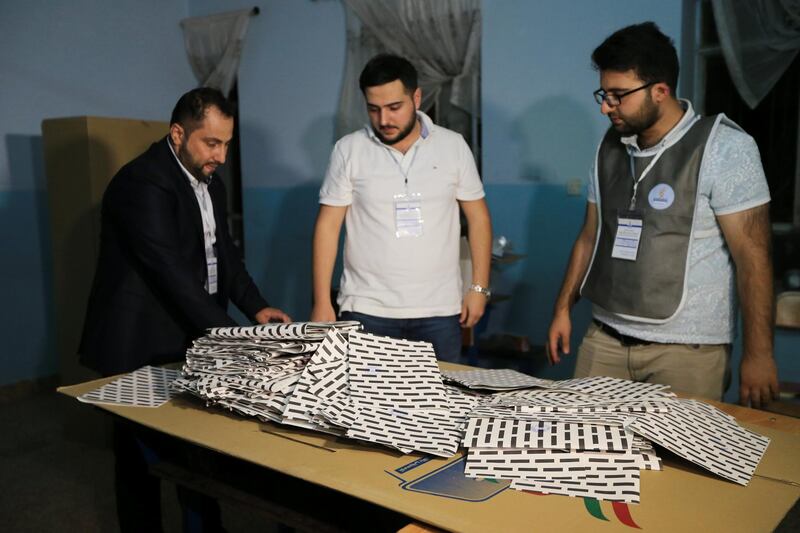The Kurdistan Democratic Party led preliminary results on Monday following the Kurdistan Region of Iraq's parliamentary elections, with rival Patriotic Union of Kurdistan hinting it might not accept the outcome of the vote.
People living in the autonomous region in northern Iraq voted on Sunday in the first election since the defeat of ISIS.
The region is divided into areas controlled by rivals KDP and PUK. The Kurdistan parliament has been largely paralysed since 2015 following a dispute over then President Masoud Barzani seeking an extension of his term, while both parties embraced a failed referendum on independence last year.
Preliminary results suggest that rather than turn against the entrenched parties, voters largely cast their ballots along previous party lines.
"As 75 per cent of the votes have been counted, the initial results indicate that the KDP is currently leading in the elections by gaining 42 seats in parliament, and PUK has come in second by winning 20 seats," a KDP official, Jangish Awakaly, told The National.
But allegations of fraud clouded the outcome of the vote.
The PUK said on Sunday night that it might not recognise the results of the election before backtracking.
In a statement, the party said its decision to reject the results in several provinces was based on what it described as violations in the voting process. The statement was later withdrawn, with some officials in the party, including Deputy Prime Minister Qubad Talabani, claiming it was "too early to judge the results".
On Saturday, the Kurdish election commission issued instructions to voters on what type of identification was required for voting, in an attempt to prevent fraud, it said.
The last four years have been challenging for the KRG – the election is an opportunity for voters to create positive changes in the region, a senior Kurdish official told The National.
An estimated three million people were eligible to vote across three provinces in the region, but many were disillusioned after years of debt problems, corruption and cuts to public salaries.
"People had the chance to cast their votes and elect the list they believe in and trust in, for the party that has demonstrated leadership and the party that has demonstrated good governance," the official said.
Meanwhile in Baghdad, politicians are expected to meet on Monday night to elect a new president among seven possible candidates.
Under the constitution, if no candidate wins a two-thirds majority, the contest can be rerun on Tuesday or at a later date.
An informal power-sharing arrangement claims that senior government roles are divided between the predominant ethno-sectarian groups; with the prime minister being a Shiite Arab, the speaker of parliament a Sunni Arab, and the president a Kurd.
Yet, Kurdistan's two historic parties are competing for the post and they were unable to agree on a nomination for the president, something that threatens their usually united front in Baghdad.
The KDP nominated Fuad Hussein, a former chief of staff to the former President Barzani. The PUK named former Iraqi deputy prime minister Barham Salih as their choice, asserting that the post should be held by one of its members.
Mr Hussein, 69, is a Shiite Kurd, who will likely win support from members of the Shiite-majority in Baghdad.
Mr Salih, a 58-year-old moderate, has served in both administrations, once as Iraqi deputy premier and Kurdish prime minister.
According to a tacit accord between the two parties, the PUK would hold the federal presidency and the KDP the post of Iraqi Kurdistan's president.
The late Jalal Talabani served as federal president for eight years.
But the Iraqi Kurdish presidency post has been left vacant since Mr Barzani resigned at the end of his mandate in the wake of the independence referendum.
Iraq's Kurds have played a key role in the war against ISIS and had hoped that their role would boost international support for statehood.
_________
Read more:
Kurdish candidates court Baghdad ahead of presidential vote
Kurdish PUK party says it will not recognise election results
Angry Iraqi Kurds file election complaints with Baghdad
_________






